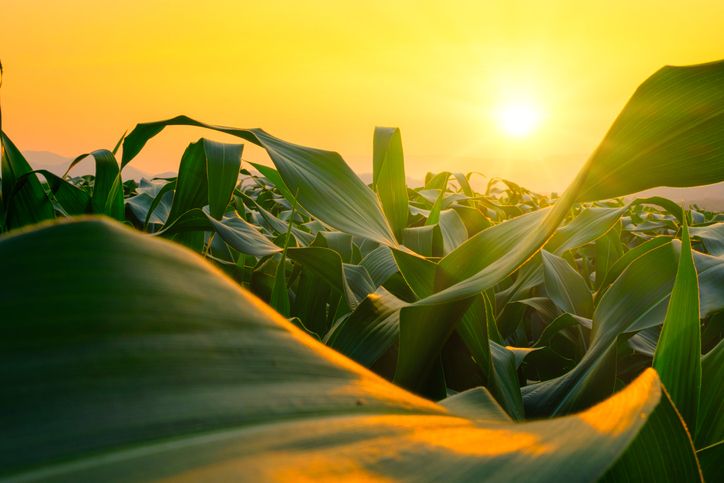Richard Lawrence is head of gene editing, yield, disease, and quality research at Bayer, based in St Louis, US.
The views expressed in this guest commentary are the author’s own and do not necessarily reflect those of AFN.
Picture in your mind a tall, sprawling field of corn. Now shrink it down while maintaining the yield.
This is just a glimpse of what the fields of the future – more resilient to climate change and extreme weather, and yet still able to provide the staple crops the world needs – could look like. Here’s why.
Protecting crops is most commonly associated with defending plants from the insects and diseases that can threaten the viability of a harvest.
However, in addition to the continuing pressures from these insects and diseases, protecting our crops today also increasingly means protecting them against the biggest and most dangerous threat of all: climate change.
The impact of climate change is real and pressing for farmers throughout the world. Insurance claims for crop losses connected to climate change in the US, for instance – through drought, flooding, and extreme winds and storms – cost some $27 billion between 1991 and 2017. In West Africa, the average production loss for sorghum and millet alone as a result of climate change stood at $6 billion per year between 2000 and 2009.
Plant science innovations continue to help farmers to be productive – not only now, but also into the future. And just as importantly, they also help to mitigate the impacts of climate change, while simultaneously building resilience against its worst effects.
The need to provide innovative technologies to farmers will only grow as we try to stay ahead of more frequent extreme weather events.
Crop scientists at Bayer and other companies are making use of RNAi (ribonucleic acid interference) – a natural process that is used to ‘turn down’ the expression of certain genes in organisms, including crops. This could be a vital technique for ensuring a climate-resilient future for farmers.
One innovative use of RNAi has been the development of ‘short stature corn.’ Here, RNAi is used to turn down a gene that plays a role in controlling height in the plant, resulting in a variant of corn that is shorter than traditional varieties.
Though counterintuitive for farmers used to associating taller crops with higher yields, shorter corn offers a range of promising benefits for farmers – and, indeed, the whole of the food system – as they face the generational challenge of climate change.
For one, reduced plant height gives shorter crops increased stability in strong winds. This can reduce the yield-robbing impacts of root lodging, where the roots of the plant are ripped from the ground; and green snap, where winds can break plants at the stalk. This short stature can make the corn less susceptible to extreme weather events like a ‘derecho,’ or extreme wind storms that can cause a lot of damage to fields that are close to harvesting.
A single 14-hour derecho event on August 10, 2020 that stretched across parts of the US corn belt caused $11 billion in total damages, proving to be the costliest thunderstorm in US history. And in China, storms are among the most significant disasters impacting agriculture, contributing to about $27 billion in losses each year.
Short stature corn is also being developed through precision breeding methods. This means the innovation can be brought as broadly as possible to farmers globally by tailoring the innovation to a grower’s region, helping them to become more resilient to the effects of climate change – protecting their productivity, crops, and livelihoods amidst rising global challenges.
Ultimately, innovations like short stature corn can transform farming for the better.
It is clear that the effects of climate change are intensifying, and this will likely mean more frequent extreme weather events, increasing risk for farmers and global food production whether through shifting temperatures, unpredictable rainfall and droughts, or other erratic climate shifts.
Agriculture needs to move, and move fast, from being viewed only as a contributor to climate change to being known a part of the solution; and innovations in crop resilience will play an important role in how we get there.
While the corn may be shorter, innovations like RNAi and precision breeding will help to ensure a longer, more resilient future for agriculture.





